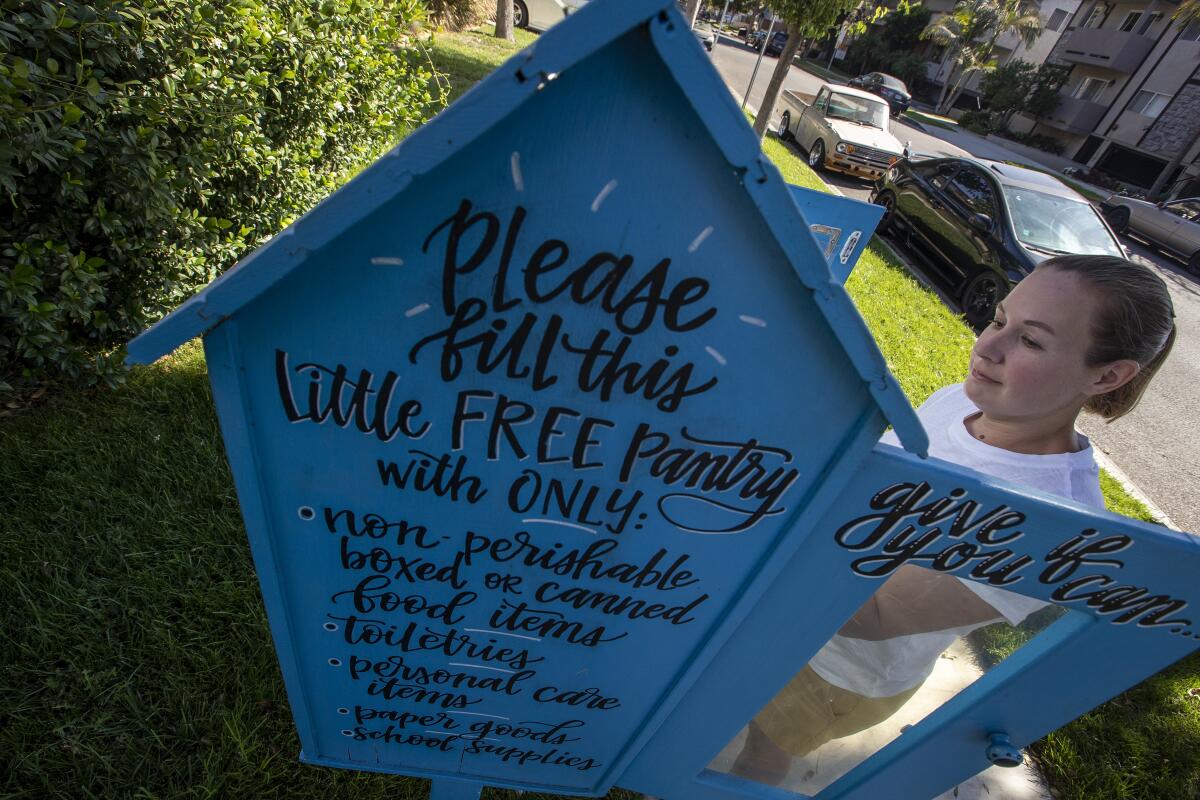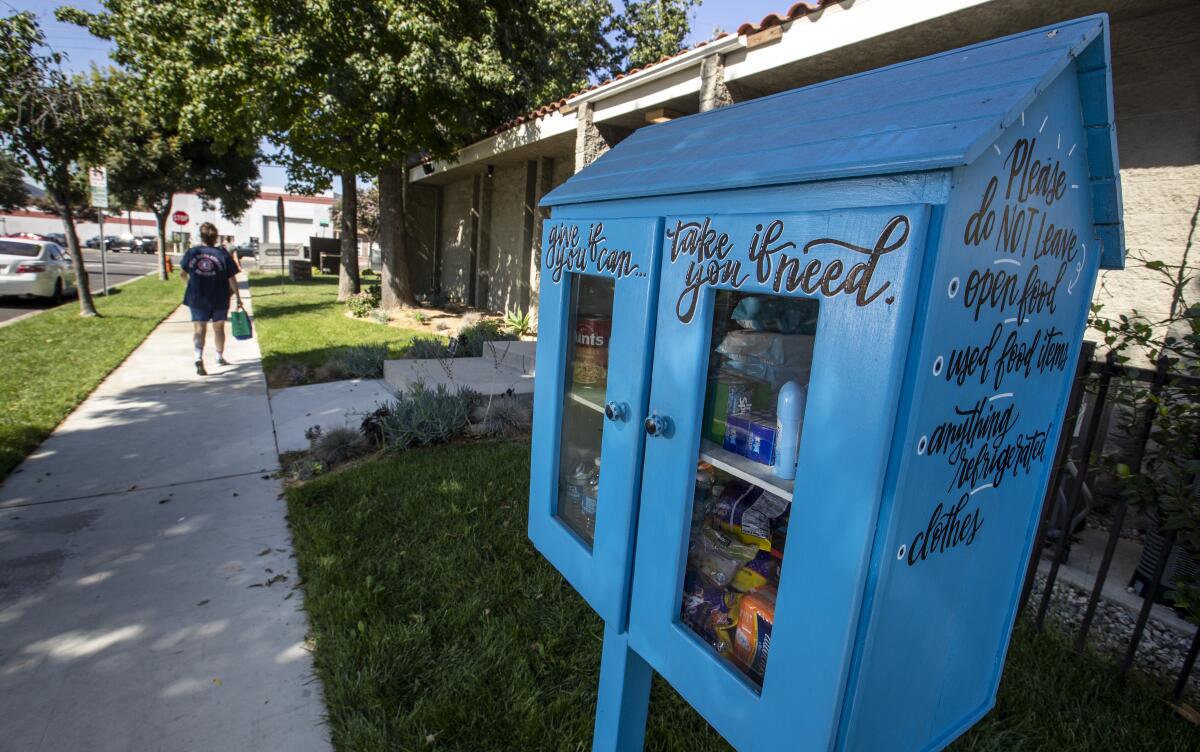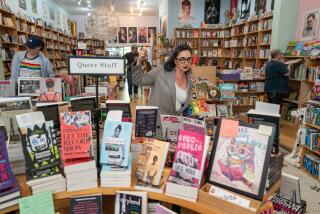Column: How the Little Free Library led to the Little Free Pantry, a fast-growing approach to helping those in need

- Share via
Sometimes a good idea spreads so fast, it’s like watching a stone skip across water.
Remember when you saw your first Little Free Library? Take a book, leave a book — so eye-catching, so simple, so I-want-to-do-that-too inspiring.
Ten years in, more than 90,000 Little Free Libraries have been registered in at least 91 countries worldwide, according to the nonprofit that oversees that movement.
And now a spinoff they sparked is starting to catch on. Maybe you’ve seen a Little Free Pantry near you?
Most are charming wooden structures that, like the libraries, look like houses. They share the libraries’ take-something-leave-something approach. But instead of books, Little Free Pantries — often placed in more-public locations — offer up non-perishable food and other necessities such as toothpaste and toothbrushes, tampons, school supplies, socks.
The aim is to help people without red tape or restrictions or records, and to do so without judgment and without inducing shame.
I’m always interested in the moment when someone decides to take action instead of just worrying about our big problems from the sidelines. When I first started hearing about local pantries this summer, what I most wanted to know was who had started them and why.
That’s how I came to be on Tara Duffy’s Burbank back porch this week, to hear about the pantry she put up outside her church last year. And it’s how I learned about other grassroots activism burbling up in Burbank, about the many people of modest means who are working to strengthen their community.

Many of us, I think, mean to help others in greater need but don’t. Our busy lives swallow us up. Or we decide that as individuals we can’t accomplish much — so we send a check somewhere, or mean to and keep saying to ourselves that we will.
Duffy told me that’s how she was until one day in 2015, when she was on the 101 on her way to work. Two exits from her office, a semi smashed into the back of her car and upended her comfortable world.
She had to have surgery after surgery to repair her back and neck. She had crash-induced PTSD and had to leave her job as a marketing coordinator. She’d played soccer since childhood and had been playing in four local leagues — but the semi kicked soccer permanently out of bounds for her. She could no longer lift her daughter, Annabelle, who was 3 years old at the time.
With the terrible pain and the budget strain when she had to leave work, no one would have blamed Duffy if she had just holed up and concentrated on getting her family through each day.
Instead, she reevaluated her life.
“And I felt like our world is in a pretty cruddy place and it felt very insurmountable — and I wanted to do something to give back.”
First she started attending services at South Hills Church, a nondenominational modern ministry that promises its congregation “relatable and practical messages from the Bible” and has a strong community service ethic to show for it. “It was all about unabashed love, give if you can and here’s how,” Duffy told me.
She joined in the church’s “Love the 818” program, which looks for ways to help Burbank. She found great satisfaction in the accomplishment of hands-on projects such as sprucing up an elementary school’s previously drab teacher’s lounge.
But Duffy wanted to do more — and she kept thinking about the Magnolia Park Mamas, a Burbank group she was part of on Facebook.
“Every now and then a mom would ask for help. She needed diapers or she needed food or she needed something to make it to the end of the month or the next check,” Duffy said. “And whenever they would ask, it seemed to me like they felt some shame. The community would always rally and be like, ‘Yes, of course,’ and it was beautiful. But I felt like, ‘What if there was a way they could just get that access without having to feel that shame?’ ”
She started thinking about Little Free Libraries and about possibly repurposing the idea. Surfing the web she discovered that others already were doing so. (The pantry movement is being loosely led by Jessica McClard, who started a Little Free Pantry in Fayetteville, Ark., in May 2016, and whose website offers a lot of practical advice as well as a gallery of some of the nearly 700 pantries worldwide that she has mapped so far.)
Duffy’s pastor supported her desire to start a pantry and was happy to have her put it on church property. She reached out to her broad Burbank circle and found many people who wanted to help. Other local movements she also had a toe in overlapped, such as Buy Nothing Burbank, through which people exchange items for free. Duffy was able to redirect such free offerings as extra diapers to her pantry shelves. Bags meant for the pantry began showing up at her front door — some from neighbors trying to combat their own food waste.
She and Annabelle, who is 7 now, and Annabelle’s 3-year-old brother, Ash, check on the pantry together each Sunday when they go to church.
“And if we have something to put in, we put it in,” Duffy said. “I think it’s a great example for them that no one’s safe, no one’s exempt from bad things happening — and that if people need support, we can do things to help them.”
She told me she hoped the idea would create a ripple, and that more pantries would soon start sprouting up.
Some already have, with their own origin stories.
Josh Omidi, a 16-year-old junior at Beverly Hills High, told me his family hands out sandwiches on skid row every Thanksgiving. But he started a pantry in front of his Coldwater Canyon Drive house last year to provide more constant help closer to home. He worries, he said, particularly about kids, and makes sure to stock pencils, pens, notebooks and binders that they might need for school.
Adam Karell, 39, said he and his wife, Monica, 36, first built a Little Free Library outside their Burbank home, and then he made her a Little Free Pantry for her birthday because they like exchanging acts rather than conventional gifts. He got permission to place the pantry at the Little White Chapel not too far from their home — and just a couple of blocks from where Duffy lives, though they haven’t crossed paths. Other people keep the pantry stocked, Karell said. “We just can’t keep up with the demand on our own.”
But he and his wife are proud that they put it out in the world as an inspiration for others.
“I like to think that they drive by it and it just makes them think of doing something nice for someone,” he told me.
Or perhaps of another good idea.
More to Read
Sign up for Essential California
The most important California stories and recommendations in your inbox every morning.
You may occasionally receive promotional content from the Los Angeles Times.











